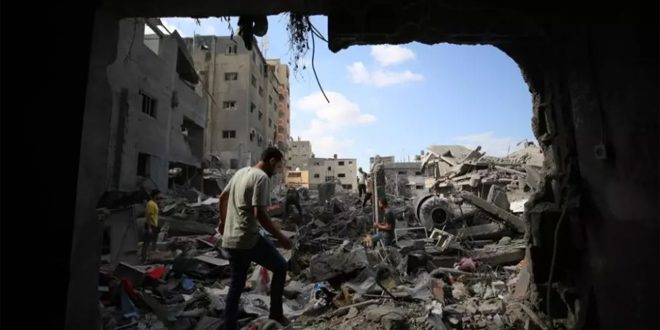Occupied Al-Quds, (ST) – Destruction and great devastation prevail in the Bureij camp in the middle of Gaza Strip, where the Israeli occupation turned the houses into piles of stones. All the neighborhoods’ features have disappeared and they have become rubble from which the smell of death spreads.
This is the condition of the camp as a result of the occupation’s continuous aggression against the Strip for more than six months, as described by Bakr Al-Awawda to SANA reporter.
Al-Awawda says: The occupation destroyed the entire eastern neighborhoods of the camp, which included thousands of homes.
He added: “The occupation’s bulldozers buried the martyrs under the rubble of homes, and its forces did not allow medical teams to remove them for burial. Its military vehicles opened wide streets in the heart of the camp after demolishing the homes. It also bulldozed and uprooted vast agricultural areas of olive and citrus trees”.
Close to the stones that were Al-Awawda’s house, Mahmoud
“The occupation has completely destroyed the infrastructure in the camp, and no one can move here. The occupation drones target everyone who moves in the camp”, Abu Helu added
The occupation was not satisfied with spreading devastation in the camp, but rather destroyed all the areas east of it and turned them into a pile of rubble, burying with them the memories of the Palestinian refugees in the camp, which were more than 70 years old, according to refugee Faisal Al-Nabahin who clarified that the occupation destroyed more than 2,000 homes east of the camp in an area extending From JuhrAl-Dik in the north to Al-Maghazi camp in the south.
Muhammad Abu Marahil narrates the tragedy of the people of Juhr al-Dik by saying: “The area was rich in natural resources and considered a food basket for the center of the Strip, but the occupation destroyed it.
He added that more than 60 multi-storey residential buildings were razed to the ground, and there are no longer habitable homes in the area.
Abu Marahil said: “The occupation committed atrocities in which entire families were exterminated. Our situation is like all areas of Gaza Strip, and the question is when the conscience of humanity will move to stop the war of extermination”.
Raghda Sawas

